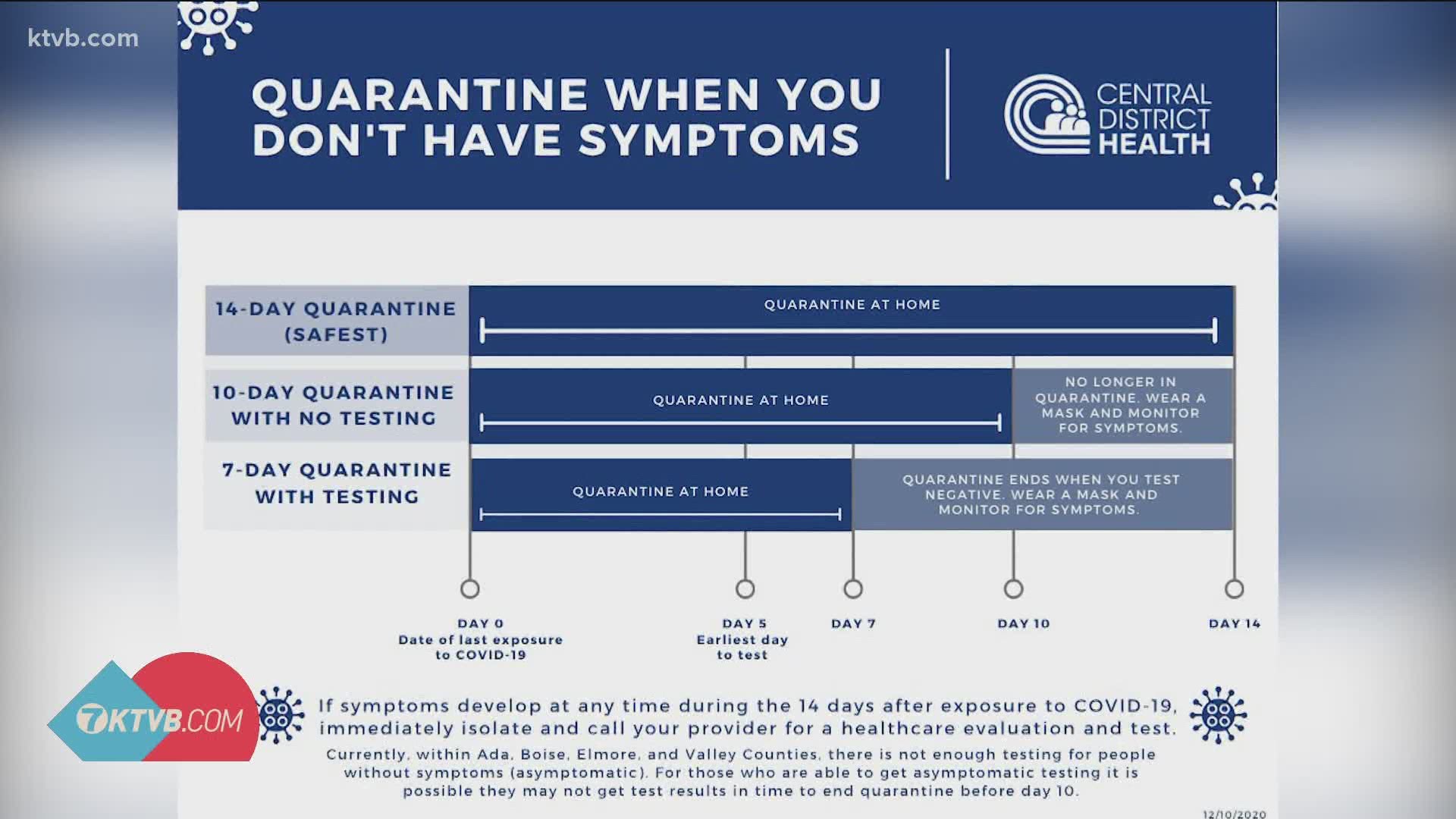BOISE, Idaho — Following new guidance from the Center for Disease Control and Prevention (CDC), Central District Health (CDH) is endorsing a reduction in the isolation period for individuals exposed to COVID-19.
Those who were exposed to or received a positive coronavirus were previously asked to self-isolate for 14 days.
“You can go now 10 days if you are asymptomatic and you haven’t had any signs or symptoms, anything congruent with illness; you feel fine and you haven’t had anything you’ve been monitoring, and you’ve been wearing a mask, doing everything you need to do, you can be outside of quarantine after 10 days,” said Brandon Atkins with CDH.
Additionally, those who have no symptoms of COVID-19 and receive a negative diagnostic polymerase chain reaction (PCR) test five days after exposure may only have to self-isolate for seven days.
“We don’t have enough testing going on right now for asymptomatic people that would really be as effective for individuals," Atkins said. "Central District Health’s primary focus is on the non-testing strategy which requires that 10-day quarantine for asymptomatic only."
This new guidance is for people who had close contact with a known or presumed COVID-19 positive person while not exhibiting any symptoms.
“If you are symptomatic, you do not fall into this category, the isolation and quarantine do not alleviate," Atkins said. "You cannot go in and get tested and be released from quarantine early. You have 10 days beyond the earliest onset of symptoms to be cleared from quarantine after you have positive symptoms or a test."
Medical providers have found some patients are reluctant to admit they are experiencing COVID-19 symptoms. Additionally, some will attribute their symptoms to something else, like a cold.
“If you’ve got a cough, if you’ve got the runny nose dripping, typical symptoms that are associated with it, you don’t have taste or smell associated with it or you are having those body aches or night sweats, those are all things that characterize you as symptomatic,” Atkins said.
Through the pandemic, contact tracing has been a major tool used to determine how and where the virus is spreading. It has also been used to notify people who have potentially been exposed and need to self-isolate.
As Idaho's case count continues to rise, contact tracing is no longer as relevant in the CDH jurisdiction, according to Atkins.
“If we see over 600 new cases a day, it’s impossible for our team to keep up with that type of workload," Atkins said. "When we were working hard and seeing 200 cases a day our epi-team felt pretty comfortable. 150-200 was really pushing that max a day but they were keeping up pretty well with a lot of the contact tracing. We’ve been over that for weeks now.”
With a shorter quarantine period, medical professionals are hopeful the time will be more manageable and will encourage people to remain in isolation for the entire duration.
“The two weeks is quite a long time, and so anything we can do to have people become more compliant, as Governor Little would say, with measures that are being offered, then we will be in a better situation to make sure people are truly following those guidelines rather than just saying, 'I’m just not going to do it,'" Atkins said.
Join 'The 208' conversation:
- Text us at (208) 321-5614
- E-mail us at the208@ktvb.com
- Join our The 208 Facebook group: https://www.facebook.com/groups/the208KTVB/
- Follow us on Twitter: @the208KTVB or tweet #the208 and #SoIdaho
- Follow us on Instagram: @the208KTVB
- Bookmark our landing page: /the-208
- And we also turn each episode into a podcast or Podbeam
- Still reading this list? We're on YouTube, too:

